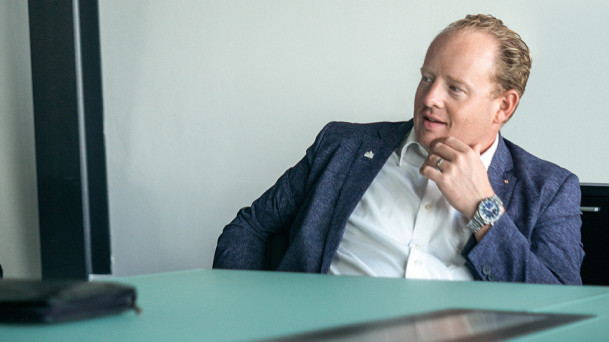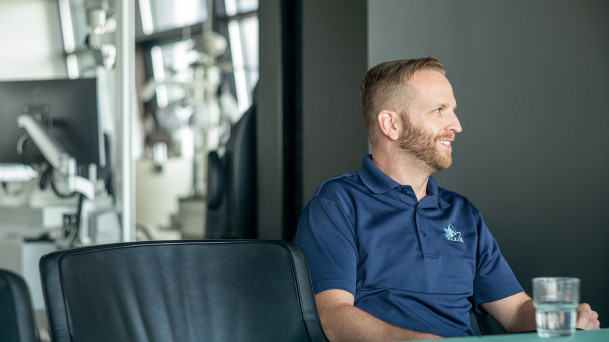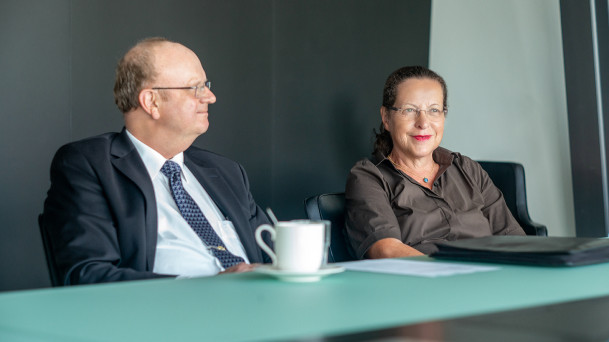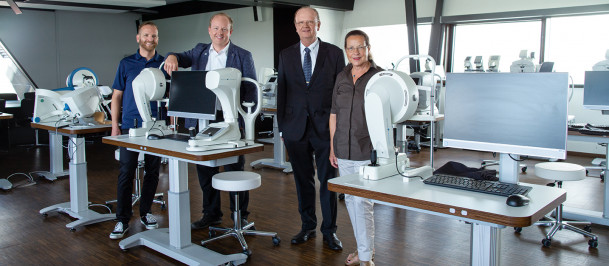Family Business
OCULUS is a family business in the third and fourth generation. We asked Rainer, Rita, Christian, and Matthias Kirchhübel what defines the character of their family business and what has been its distinguishing feature?
It is a well-known fact that the first impression is most important. We get an unexpected first impression during a joint lunch with family Kirchhübel in the company headquarters of OCULUS. The espresso is served on the upper floor before the official part of the meeting is about to begin.
W3+: Tellingly, the term family business is a cohesive expression. Is it possible at all to separate family and business at OCULUS?
Rita Kirchhübel: Hardly. It doesn’t matter if we want to enjoy some home time at the end of a work day or if we’re sitting around the lunch table on a Sunday – the company is always present. That’s great when we exchange our views about pleasant matters but in difficult phases, this is also burdensome. Sometimes, I’ll put my foot down when I think that not every conversation has to be about the company. This will be respected but usually it won’t last. (laughs)
Christian Kirchhübel: You really have to exert discipline over yourself so that you don’t carry everything that is business into the family. But I don’t know it any other way. Sometimes, this is, as my mother says, quite burdening. But what outweighs it by far, in my opinion, is the direct exchange of views which we cultivate in this familial constellation.
W3+: Mr. Kirchhübel, you have been in the company since 1979 and on the management board since 1981. Your father, Kurt Kirchhübel, was head of the company for almost forty years, from 1947. What piece of advice did he give you?
Rainer Kirchhübel: Naturally, the company has always been present in our family even then. I was the youngest of six children. When my father was talking about the developments in ophthalmic optics and diagnostics, I always listened wide-eyed although I didn’t understand much about it as a child. I remember Professor Curt Cüppers from the university hospital Gießen who was a distinguished expert in strabismus medicine and a frequent guest in our house. He had a sonorous voice and discussed the development of instruments with my father. It wasn’t so rare for us as children that we got our eyes “dripped” so that they could test the prototypes my father had developed.

»We often have intense discussions within the family
but the decision will always be made in the interests
of the company.«
Christian Kirchhübel
W3+: OCULUS has been collaborating closely with partners from research and science for many decades.
Rainer Kirchhübel: That’s correct. The close collaboration with professors Mr. Heinrich Harms and Ms. Elfriede Aulhorn from the university hospital Tübingen brought forth a device for visual field testing, a so-called manual perimeter. Also in cooperation with the university Tübingen, we developed a device for testing the scotopic acuity and sensitivity to light at the beginning of the 1960ies. It even got my father and me an invitation to a German television show on health issues called “Gesundheitsmagazin Praxis”. As a teenager, I found this fascinating, of course. And in hindsight, I have to say: We really were at the pulse of time, the more so as the compulsory eyesight test for acquiring the driver’s license had just been introduced at that time.
W3+: Every new generation has new ideas. During your time as managing director, was there some kind of innovative spark in technology which turned out to be a door opener?
Rainer Kirchhübel: I was in my late twenties when I joined the management board at the beginning of the 1980ies, and the pressure from other people’s expectations was at least as great as their skepticism. A first innovative spark started out small so to say because originally, it was about the development of a device for the rather negligible sector of glass body surgery. Essentially, however, it was a revolution in indirect ophthalmology where the eye is getting inspected with a magnifying glass and a lighting appliance. As a result, you will then get an image which is inverted and upside down. Working under such difficult conditions is an extremely challenging brain-twister for an operating surgeon. In 1988, we succeeded in launching device for this kind of indirect ophthalmology which reverses the image. This did not only impress the handful of glass body surgeons but far more clients from many other areas.
Another landmark was the Pentacam about 15 years later. At that time, it was state of the art to be able to peer into the eye with so-called Scheimpflug cameras and to get the standard shot as a two-dimensional picture. Then, our developer Gert Köst had the idea to design a rotating Scheimpflug camera which makes it possible to combine the shots to get a three-dimensional image. This did really work and it was a revolution. From this originated the 3D-Scheimpflug camera Pentacam which has made us global market leaders in the precise measuring of the front sector of the eye over several generations by now.
W3+: How do you manage to keep up with the times or even stay ahead of them in product development?
Rita Kirchhübel: I think the mentioned examples illustrate quintessentially what matters in our business in particular: the continuous technological development on the one hand and the further development of the products in application on the other hand. We have a wide spectrum of devices and instruments ranging from trial frames to the Pentacam. And we have a clientele which is just as wide-ranging as highly specialized and among which you will find opticians and ophthalmologists as well as occupational physicians. Although everything in our business is centered around the eyes, we also keep our ears trained closely on our customers. This is crucial because, in the end, we develop our devices to make their jobs easier.

»We manufacture high-quality products in comparatively small quantities. And in order to do so, we have set up a completely new optics production in accordance with the latest technology and state-of-the art automation in the last three years.«
Matthias Kirchhübel
W3+: Has it always been clear for you as the next generation that you would join the parental business?
Christian Kirchhübel: As we already pointed out, our family and our business are inseparably intertwined. That’s how we also experienced it when we were children. My brother and I, we have always been “at home” in the company. When we were teenagers, we did pretty much any rewarding and unrewarding job in the workshops, in logistics and in shipping during our holidays. I then entered into the management board officially after my business administration studies.
Matthias Kirchhübel: When you asked a little boy of my generation what he would like to do for a living when he was grown-up, most of them would answer: firefighter. For me, it was dead certain that I would become an engineer. Considering that I was already able to disassemble a coffee maker when I was a child – and that it was really broken for sure after that (laughs). But I knew: My father was an engineer. And to some extent, he had really been a role model for me. So I studied mechanical engineering and returned to the company as a graduate engineer.
W3+: With all due appreciation for the parents – a generational change does cause some friction as well, doesn’t it?
Matthias Kirchhübel: Of course. But as we well know friction produces heat. Basically, this is a good thing unless the parties overheat. And in our family, we have managed to get it about right so far. All of us are very technophile and we can trust on that we know what we are talking about. And: We respect the opinion and the level of knowledge of the corresponding other person to the highest degree. Of course, I looked into mechanical, application-specific and digital manufacturing processes during my studies which were far from anything that my father had learned when he became an engineer or what he determinedly put into practice afterwards as an entrepreneur. However, he does not see this as a competition in his own house but views it most definitely as an asset.
Christian Kirchhübel: I can only confirm this. Of course, any decision about what kind of new machines are to be acquired for an optimized production will follow technical and economic considerations. We often have intense discussions about such matters within the family but the decision will always be made in the interests of the company.

»Although everything in our business is centered around the eyes, we also keep our ears trained closely on our customers.«
Rita Kirchhübel
W3+: “Made in Germany” is an internationally appreciated stamp but also a cost-intensive affair. You still allow yourself the luxury of an in-house development and an extremely deep vertical range of manufacture in the middle of Germany. How do you afford this?
Matthias Kirchhübel: You see, we manufacture high-quality products in comparatively small quantities. And in order to do so, we have set up a completely new optics production in accordance with the latest technology and state-of-the art automation in the last three years. Anything we are unable to manufacture in our factory will be purchased from chosen suppliers who mostly come from the region. Why do we do this? Because we place great value on the highest quality and precision. And because our customers appreciate that a lot.
Rainer Kirchhübel:
There is also the fact that the deep vertical integration makes us much more independent – this has had a very positive effect especially during the months of the Corona crisis.
W3+: Is this a crumb of comfort in the current year which should have been a big anniversary year?
Rita Kirchhübel: Actually, we intended to celebrate the whole year. As a highlight, we had planned to throw a big party with our international staff, distributors and customers. But due to well-known reasons that has come to naught. To be honest, we didn’t even chink glasses to our anniversary in the family. That’s because we were occupied twenty-four-seven with seeing to how to proceed during the past months. And presumably, this won’t change so fast. But we will come together at the turn of the year to drink a toast to the next year, that’s for sure.
Additional Information:
www.oculus.de
